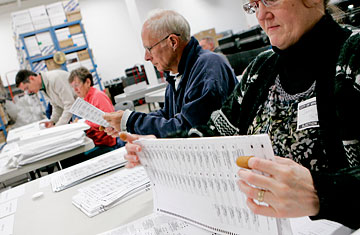
Election judges sort ballots on Nov. 19, 2008, before the recount begins in the U.S. Senate race between Republican Sen. Norm Coleman and Democrat Al Franken
With just 215 votes separating him from Republican incumbent Norm Coleman, every possible uncounted ballot matters to Al Franken. And so the ruling from the Ramsey County District Court, while small, might well be a critical skirmish that the former comedian can claim as he tries to win the war of attrition that is Minnesota's Senatorial recount. The Democratic Party's ability to overcome filibusters in the Senate may depend on the outcome.
The district court's ruling itself is a half-way measure for Franken. It ordered the state's second largest county to turn over to the Franken campaign information on voters whose absentee ballots had been rejected. Ramsey County rejected roughly 750 of the nearly 13,000 absentee ballots submitted, or 5.7%. That isn't much but considering the small size of Coleman's current lead, it could prove to be an important avenue for Franken to close the gap. Minnesota law allows elections officials to count legally rejected ballots if they can determine voter intent. With voter information in hand, the Franken campaign can also try to determine whether a ballot has been erroneously rejected. Minnesota law allows ballots that have been thrown out because of "administrative errors" to be counted.
Ramsey County District Court Judge Dale B. Lindman ruled that the voter information was public data and not private as Ramsey's attorneys had argued. By Wednesday evening the county had turned over the information to the Franken campaign. Ramsey County assistant attorney Darwin Lookingbill confirmed that the county will not appeal the ruling.
Minnesota's 87 other counties are expected to turn over their data as well, which may add to Franken's potential bonanza. From existing data, TIME estimates that as many as 285,000 Minnesota voters submitted absentee ballots. The number of rejected ballots is not yet known. Still, if Franken gets the state's other counties to give him voter information for their rejected absentee ballots, he might be able to move toward a bank of 16,000 uncounted ballots, if each county rejected a similar percentage as Ramsey. "If [Franken] can get those rejected ballots in the mix I think he's got a much stronger opportunity to win the race," says David Schultz, a Hamline University professor who specializes in elections law.
The State Canvassing Board, however, has yet to decide whether to consider the rejected absentee ballots; and the campaign still has to match the information about the disenfranchised voters against the rejected ballots and then to figure if any were rejected in error and whether it is worth trying to determine the voter's intent. If the Canvassing Board chooses not to consider the ballots, Franken may have to urge uncounted voters take the issue to the courts — further delaying a recount that is already expected to take three more weeks to conclude. The process may make everyone nostalgic for the simple days of hanging chad.
